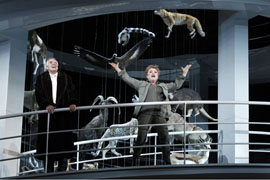Concert Review: Celebrating Strauss/ Sydney Youth Orchestra

Celebrating Strauss: Richard Gill, a celebration of life
Sydney Youth Orchestra
Verbrugghen Hall, Sydney Conservatorium of Music
8 December 2018
Written by Deen Hamaker
Australia lost one of its foremost champions of music education in Richard Gill AO in October 2018, who for over 40 years was at the forefront of music education in this country. He left behind a legacy of amazingly talented musicians whom he mentored. Gill was also a formidable conductor, was Director of Chorus at The Australian Opera from 1990 to 1996 and established the Victorian Opera in 2005. It was apt that the Sydney Youth Orchestra dedicated this concert to Richard Gill, who led the orchestra as Chief Conductor from 1978 to 1982. His passion for educating young musicians and bringing the joy of classical music to young people was a driving force in his life. This concert was a wonderful tribute to a towering figure in the Australian music world who is gone too soon and will be greatly missed.
The program of music by Richard Strauss, a musical genius of the first half of the 20th Century, contained three pieces chosen which showed the breadth of his prodigious output, starting with his early tone poem Don Juan, composed when he was just 24, to his Four Last Songs published posthumously and first performed in 1950. We were also treated to highlights from his perennially popular opera Der Rosenkavalier as a sumptuous conclusion. Strauss’ music is known for its intensity, stunning orchestrations and lush romanticism. It is indeed a brave choice for an orchestra of young people to take on, but with sparkling technique and excellent musicianship this was a wonderful performance and every player on the stage rose to the occasion.
Don Juan, composed in 1889, set the stage for Richard Strauss’s career. The quickfire changes of mood and startling orchestral colours are already in evidence as is the influence of Wagner and the enthusiasm of a young composer exploring his potential. The work requires bravura playing from the horns and the young players of the Sydney Youth Orchestra did not disappoint. Don Juan traverses the story of the eponymous rascal as he seduces women by moonlight, fights duels and eventually falls on the sword of an opponent. Under the wonderful direction of Chief Conductor Alexander Briger AO, the SYO played with dynamism and brio.
From the beginning of Strauss’s career, we moved to its end and his Four Last Songs. It is not known if Strauss intended these songs to be performed as a cycle as they were ordered and published after his death in 1949. He had composed them the year before in 1948. The songs embody the final summation of Strauss’s lifelong love affair with the soprano voice. These four songs have become one of the hallmarks of the soprano repertoire. It was therefore a great privilege to have Cheryl Barker AO, renowned for her interpretations of so many of Strauss’ heroines on the opera stage, to sing these masterpieces. She was in complete command of her stunning instrument. Most remarkable was her innate ability to imbue her singing with the power of feeling. Her voice glowed with warm expressive colour, invoking the differing moods of each of the songs. Moving from Frühling (Spring) to the autumnal colours of September and the darkening mood of the last two songs, Cheryl Barker took us on a journey. Accompanying singers is not something that is innate to an orchestra. It requires finely balanced and sensitive playing. The SYO realised the lush romanticism reflected in the songs, providing excellent support over which Cheryl Barker soared.
The highlight of the evening, excerpts from Richard Strauss’s masterpiece, Der Rosenkavalier, featured Australian coloratura soprano Emma Pearson and French mezzo-soprano Caroline Meng. Premiering in 1911 in Dresden, Der Rosenkavalier was an acute about-face for Strauss, as he moved away from his shocking operas Salome and Elektra. Here he conjured up the nostalgic world of a dreamlike 18th Century Vienna. Young romance triumphs but the result is bittersweet as the young hero, Octavian (set for a mezzo-soprano), leaves his older lover, the Marschallin, for the sweet ingenue, Sophie. Strauss was able to indulge his passion for the soprano voice as all three principal characters are played by women. He lavished some of his most beautiful music on these three roles, in fact, some of the most beautiful music in all opera. In the first excerpt, The Presentation of The Rose from the start of Act II, Octavian presents Sophie with a silver rose, the traditional gift to a fiancée, on behalf of his oafish cousin Baron Ochs. Sophie and Octavian instantly fall in love. The duet that follows is heart-stoppingly beautiful. Australian coloratura soprano Emma Pearson was a sparkling Sophie and Caroline Meng a sensational Octavian.
As beautiful as this duet is, the conclusion of the opera arguably contains even more of the most gorgeous music ever composed for the operatic stage. At the conclusion of the opera, Octavian and Sophie are reunited and the Marschallin realises that she has to relinquish Octavian. In a stunning trio, just before the end, the three characters sing together of their anguish, joy and love, their soaring lines wrapping around each other in a cloud of soprano gorgeousness. Here we were treated to a world-class cast as Cheryl Barker, famed for portrayal of the Marschallin, joined Emma Pearson and Caroline Meng. Time was suspended as the sublime trio sang – the ecstatic couple, Sophie and Octavian singing of their new-found love, while the Marschallin leaves to organise their betrothal with Sophie’s father Faninal. Then, a surprise. As Cheryl Barker re-emerged she was accompanied by her husband, baritone Peter Coleman-Wright AO, who took on the role of Faninal for the conclusion of the opera. Capping a spectacular concert, this sizeable excerpt from the opera was beautifully performed. Each of the singers inhabited their characters singing Strauss’ lush music magnificently. The orchestra played with all the longing and romanticism that one could wish for; they displayed a laudable professionalism and contagious enthusiasm that belied their youth.
Faninal’s final phrase is “Sind halt aso, die jungen Leut’!” (“’Tis just their way, youth will be young!”). The Marschallin simply responds “Ja, ja” (“Yes, yes”). I can’t think of a more perfect ending to an awe-inspiring concert by exuberant and talented young people celebrating the life of a passionate music educator.
Deen Hamaker for SoundsLikeSydney©
Deen Hamaker is a passionate opera aficionado and commentator. Introduced to theatre, opera and classical music at a very young age, he has acted in and directed several theatre productions, both in Australia and overseas. Deen lived in Japan for several years and studied the performing arts of Asia. Deen’s particular passion is opera, particularly the Russian, French and Modern repertoire. Deen was a contributing author for “Great, Grand and Famous Opera Houses”, 2012. Fluent in Japanese, Deen holds a Bachelor of Arts in Japanese from Griffith University and currently lives in Sydney.






